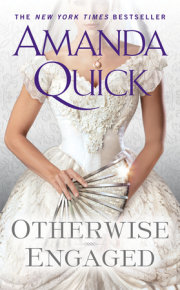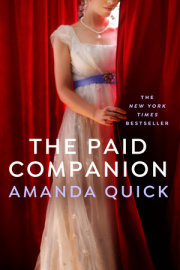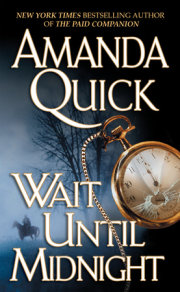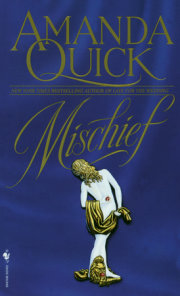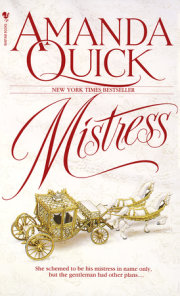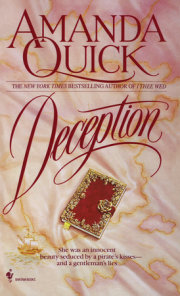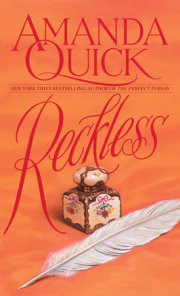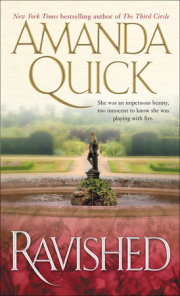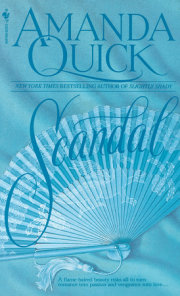***This excerpt is from an advance uncorrected copy proof***
Copyright © 2018 Amanda Quick
Chapter One
The screams of the patients on ward five told Adelaide Blake that time had run out.
She stopped searching for the key to the file cabinet and went to stand at the door of the small office. She had not dared to turn on any lights in the laboratory. There was enough moonlight spilling through the high, arched windows to illuminate the long workbenches and create ominous silhouettes of the equipment and instruments.
The wails and shrieks and howls from the floor below were escalating rapidly. Something or, more likely, someone was agitating the patients. The ward on the fifth floor was reserved for the most hopelessly mad and insane. The locked rooms housed those who were forever lost in their own private hells. Some of the patients were afflicted with violent, paranoid visions and hallucinations. Others battled fearsome monsters that only they could see.
Soon after she had been locked in one of the cell-like rooms on ward five she had learned that the patients provided an excellent alarm system, especially at night. Nights were always the worst.
The nerve-shattering chorus of the damned echoed up the stone staircase. There was no one around to calm the inmates. The orderlies on the locked ward had been given the night off.
She could not delay any longer. If she did not escape now she might not make it at all. She would have to leave the file behind.
She left the doorway of the office and started to make her way cautiously through the maze of workbenches. She had plotted her exit strategy down to the smallest detail but the last minute decision to look for the file had put the plan in jeopardy. She had to get out of the laboratory immediately or she might not escape.
Originally, the Rushbrook Sanitarium had been the private mansion of a wealthy, eccentric industrialist who had intended to entertain on a grand scale. The result was a gothic nightmare of a house with five floors, endless hallways and the tower room that now served as a laboratory. The single redeeming architectural virtue as far as Adelaide was concerned was that there were a number of discreetly concealed staircases intended for the use of a large staff.
Most of the servants’ stairs had been permanently closed and sealed long ago. Others had disappeared under various waves of renovations and remodeling projects. But a few were still accessible. She had the key to one of the little-used staircases.
She was halfway across the lab when she heard the panicky footsteps on the tower stairs. Someone was coming up to the laboratory. Whoever it was would see her as soon as he turned on the lights.
There was nowhere to hide except behind Ormsby’s desk. Discovery spelled doom. Dr. Gill would order increased security for her. She might never have another chance to escape.
A cold sense of certainty sliced through the fear. If necessary, she would try to fight her way out of the sanitarium. She could not—would not—go back to the cell on the fifth floor. She would rather die.
She turned quickly, searching the shadows for something that could function as a weapon. She knew the lab all too well because it was where they brought her when Gill and Ormsby decided to give her another dose of the drug. In her desperate attempt to hold onto her sanity by focusing on an escape plan she had memorized every inch of the tower room.
She went to the nearest cabinet, yanked open the door and pulled a couple of glass jars off the shelf. She had no idea what she grabbed –it was too dark to read the labels—but she had seen Ormsby take a variety of chemicals out of the cabinet. Many were flammable. Some were highly acidic.
With the two jars in hand she hurried back into the office. Dr. Ormsby’s desk was neat and tidy. He was a fussy little man who was obsessed with his research, but orderliness was high on his list of priorities.
Aside from the usual desk accessories—telephone, blotter, and inkwells—there was one other object on the desk. The black velvet box looked as if it had been made to hold a woman’s collection of jewelry. But Adelaide knew there were no necklaces, rings or bracelets inside. The velvet box contained a dozen elegantly cut crystal perfume bottles.
She made it behind the desk with the jars of chemicals just as Dr. Harold Ormsby staggered into the darkened laboratory. It sounded as if he was gasping for air. He did not turn on any lights.
“Get away from me,” he shrieked. “Don’t touch me.”
Adelaide heard other footsteps on the stone staircase, the slow, steady, determined tread of a predator stalking prey.
Ormsby wasn’t trying to catch his breath, Adelaide realized. The doctor was in the grip of raw panic.
Ormsby’s pursuer did not respond, at least not verbally. Crouched behind the desk, Adelaide removed the tops of the jars. The acrid odors that wafted out made her gasp and turn her head away. She hoped the screams of the patients covered the small sounds she made.
She tried to keep her breathing as light and shallow as possible but it wasn’t easy. Ice-cold perspiration dampened her skin. She shivered and her pulse skittered wildly.
Ormsby screamed again, louder this time. The high, unnatural screech affected Adelaide like a bolt of lightning. For a few seconds she wondered if it had stopped her heart.
And then she wondered if lightning actually had struck the laboratory. A narrow beam of fire blazed in the darkness. Peering around the corner of Ormsby’s desk she watched the glow move past the office doorway.
Orsmby’s piercing screams rose above the cacophony from the fifth floor patients, the cries of a man who is being sent into hell.
Running footsteps reverberated in the tower room. Heavy glass shattered. Night air flowed into the laboratory.
Ormsby’s hopeless cries echoed in the night for another second or two. The suddenness with which they were cut off told its own story.
Adelaide froze as she realized what had just happened. Dr. Harold Ormsby had leaped straight through one of the high, arched windows. No one could survive such a fall.
In the shadows of the lab the fiery light winked out. It dawned on Adelaide that someone had lit a Bunsen burner and used the flame to drive Ormsby out the window. That didn’t make sense. He had obviously been terrified, but she knew something of the man. It was easy to imagine him pleading for his life or cowering in a corner but jumping to his death seemed oddly out of character. Then, again, she was not the best judge of character. She had learned that lesson the hard way.
The screaming from the fifth floor ward got louder. The patients sensed that something terrible had happened.
Adelaide heard rapid, purposeful footsteps crossing the tile floor, coming toward the office. She gripped the containers of chemicals and waited, aware that the only thing protecting her now was the noise from the inmates down below. The shrieks and cries would make it difficult if not impossible for the killer to hear the sound of her breathing.
The intruder stopped directly in front of the desk. A flashlight came on briefly. Adelaide prepared to fight for her life.
But the intruder turned and hurried quickly out of the office. A few seconds later footsteps sounded on the stairs.
The keening of the agitated patients rose and fell but there were more shouts now. They came from the courtyard below the broken window. Someone had found Ormsby’s body and was sounding the alarm.
Adelaide waited a few heartbeats and then got to her feet. She was shaking so badly she had a hard time finding her balance. She thought briefly of trying once again to find the key to the file cabinet but common sense prevailed. Escape from the sanitarium was the first priority.
She reached up to adjust the nurse’s cap pinned to her tightly knotted hair. When she glanced down at the desk she saw that the black velvet box containing the perfume bottles was gone. The intruder had taken it.
She selected one of the two open jars of chemicals to use as a weapon and left the other one behind on the desk. She picked her way through the moonlit lab. When she got to the staircase she descended cautiously.
At the foot of the stairs she paused in the stairwell and looked around the edge of the door.
The inmates continued to howl and scream through the grills set into the locked doors but the hallway was empty. There was no sign of the intruder.
Her room was located at the far end of an intersecting hallway. There were no other patients in that corridor. Earlier she had arranged the pillows and blankets on her bed in an attempt to approximate the outline of a sleeping figure but it looked as if the ruse had been unnecessary. The agitation of the other inmates and the commotion in the courtyard were providing sufficient cover to conceal her movements. The white cap and the long blue cloak, familiar elements of a nurse’s uniform, would do the rest. With luck anyone who chanced to see her from a distance would assume she was a member of the hospital staff.
The entrance to the old servants’ stairs was in a storage closet on the opposite side of the hall. She was edging out of the stairwell doorway, preparing to make a dash for the closet, when the patients’ screams rose in another hellish crescendo. It was all the warning she got. It was just barely enough to save her.
She retreated to the shadows of the stairwell and waited. When the screams faded a little she risked a peek around the doorway.
A man dressed in a doctor’s coat, a white cap and a surgical mask emerged from the hallway that led to her room. The black velvet box was in his left hand. In his right he gripped a syringe.
The only thing that saved her from being seen was that the masked doctor was intent on rushing down the hall in the opposite direction. He disappeared through the locked doors just beyond the nurse’s station.
She did not think it was possible to be any more terrified but the sight of the masked doctor leaving the corridor that led to her room sent another shock of horror across her nerves. Maybe he had intended to kill her, too.
With an effort of will, she pulled herself together. She certainly could not continue to dither in the stairwell indefinitely. She had to act or all was lost.
She took a deep breath, clutched the jar in one hand and rushed across the hallway. She opened the door of the storage closet.
A bearded face appeared at the steel grill set into a nearby door. The insane man stared at her with wild, otherworldly eyes.
“You’re a ghost now, aren’t you?” he said in a voice that was hoarse from endless keening and wailing. “It was just a matter of time before they killed you, just like they did the other one.”
“Goodbye, Mr. Hawkins,” she said gently.
“You’re lucky to be dead. You’re better off now because you can leave this place.”
“Yes, I know.”
She slipped into the storage closet, closed the door and turned on the overhead fixture. The door to the service stairs was at the back. It was locked. To her overwhelming relief, the key she had been given worked.
By the time she made it downstairs to the darkened kitchen on the ground floor she could hear sirens in the distance. Someone had telephoned the local authorities. The sanitarium was located a couple of miles outside the small town of Rushbrook. It would take the police and the ambulance several minutes to arrive on the scene.
There was no one around to see her when she slipped out of the kitchen. She inserted another stolen key into the lock on the massive wrought iron gate that the delivery vehicles used.
And then she was free, hurrying down a rutted lane with only the light of the moon to guide her.
She was not at all sorry that Ormsby was dead but his death could complicate her already desperate situation. It would be so easy for the authorities to conclude that the patient who had escaped the secure grounds of the Rushbrook Sanitarium on the night of the doctor’s mysterious demise was, in fact, a crazed killer.
She had to get as far away as possible from the asylum before the orderlies realized she was gone.
It occurred to her that one person already knew she had disappeared—the doctor in the surgical mask who had gone to her room with the syringe.
She wanted to run but she did not dare. If, in the darkness, she stumbled over a rock or a fallen tree limb she could twist an ankle or worse.
The emergency vehicles passed her a short time later. They never noticed her hiding behind the heavy shrubbery at the side of the lane.
Dawn found her standing on the side of a highway hoping that a passing motorist would take pity on a nurse whose car had run out of gas in the middle of nowhere.
She raised her hand to wave down a truck. The gold wedding ring on her finger gleamed malevolently in the morning light.
Chapter Two
Two months later
Burning Cove, California . . .
“Your new neighbor is back,” Florence Darley said in a low voice. She plucked the kettle off the stove and poured hot water over the leaves in the teapot. “That makes eight days in a row except for Sunday.”
Adelaide did not look up from the small scale she was using to measure a quarter pound of Tranquility tea. “We’re closed on Sundays.”
“Which only goes to prove my point. Mr. Truett has become a regular. I see he’s reading the morning edition of the Herald, as usual. Five will get you ten he’ll order the same thing—a pot of that very expensive blend of green tea you convinced me to order from the San Francisco dealer, no sugar, no teacakes, no scones, no cookies.”
“Mr. Truett does seem to be a man who likes to keep to a routine,” Adelaide said.
She did not add that Truett’s apparent preference for keeping to a schedule made it easy to time his morning walks on the beach. He never failed to show up at seven-thirty. He always walked for precisely thirty minutes. It was June and there was often fog in the mornings at this time of year but that did not stop him.
She was the one who was annoyed by the fog, she thought. It meant that she could only catch fleeting glimpses of him taking his daily walk. And she had to admit she had come to look forward to watching Jake Truett in the mornings. He might be a man of strict habits but he did not move like a man who was a stickler for rules and regulations. He did not march across the sand like a martinet. Instead he prowled the beach with the easy physical power of a large hunting cat.
Florence chuckled knowingly. “I don’t think he’s here every day because of your fancy tea. And he doesn’t come in because we’re fashionable these days. He’s not the type to care one bit if the customer at the next table is a celebrity or a garbage collector. Got a hunch you’re the reason our Mr. Truett has developed the habit of stopping by.”
Adelaide flushed. She was very fond of her new boss, not to mention extremely grateful for the job, but Florence’s newfound determination to play matchmaker made her uneasy.
After two months in Burning Cove, she was just starting to breathe more easily. No manhunt had been launched to recapture an escaped mental patient. In fact, there had been no mention in the press of her late night departure from the Rushbrook Sanitarium.
As far as she could tell no one was looking for her. Nevertheless, she was not yet ready to take the risk of dating. At least, that’s what she told herself every day when Jake Truett walked into the tearoom carrying a leather briefcase, sat down at the same table and asked for green tea, no sugar, no teacakes, no scones, no cookies.
Florence had other ideas. She was a plump, comfortably proportioned woman in her late sixties. She had opened the tearoom nearly a decade earlier in the wake of the Crash and somehow managed to keep it going during the worst of the hard times.
The tearoom had survived because the exclusive town of Burning Cove was a retreat for the rich and the famous, two groups that were largely insulated from the financial disaster that had shaken the rest of the country. But even in such a wealthy community it took fortitude and sound business instincts to stay profitable. Florence possessed plenty of both qualities. Adelaide was learning a lot from her.
In addition to hiring a waitress with no restaurant experience and no references, Florence had helped her find an inexpensive place to live, a cottage on the bluffs above Crescent Beach. When Adelaide had explained that she could not come up with the first month’s rent, Florence had waved off the problem. “Don’t worry, I’ll take care of it and you can repay me later. Something tells me you’ll earn your keep.”
Adelaide was pleased that she had, indeed, begun to earn her keep. She badly wanted to repay the debt. When she suggested that Refresh start creating and marketing specialized teas and herbal tisanes, Florence was dubious but she agreed to let the experiment take place. Within a month, the Refresh Tearoom, which had enjoyed a quiet but steady business for years, moved up to an entirely new level of prosperity.
Recently, a few of the celebrities, socialites and tycoons who used Burning Cove as a vacation playground had begun requesting exclusive blends designed for specific personal needs. In the past few weeks Adelaide had concocted teas and herbal tisanes to treat a variety of complaints—insomnia, anxiety, and lack of energy. One of her most popular teas was the one she had created to alleviate the symptoms of a hangover—a common problem for the Hollywood set who tended to party until dawn.
Business had picked up so much that Florence was thinking of hiring another waitress so that Adelaide could concentrate on creating and packaging the special blends.
All of which made it so much more difficult to come up with excuses for a failure to show an appropriate interest in an apparently eligible male. Jake Truett did not wear a wedding ring but Adelaide reminded herself that didn’t mean much. She didn’t wear a wedding ring, either.
She filled the small sack with the quarter pound of Tranquility tea blend that she had just measured. “I really don’t think Mr. Truett is interested in me, Flo. We’re two very different people. He’s a wealthy businessman who has traveled the world. I’m a tearoom waitress. I’ve never been out of California. It’s not as if we have a great deal in common.”
“I think Mr. Truett is just shy,” Florence said. “He’s trying to work up his nerve to ask you out. You should give him some encouragement.”
“Trust me, the man is not the shy type. I’m very sure that if he wanted something, he would go after it.”
“I told you, I heard that he was widowed a few months ago. That means he’s out of practice when it comes to dating.”
“He’s probably still grieving,” Adelaide said. “That would explain why he never smiles.”
“Maybe he just needs a reason to smile.” Florence winked, picked up the pot of tea she had just prepared and bustled out of the kitchen.
There was no point arguing with her. Adelaide suppressed a sigh, dusted tea off her hands, folded the top of the sack and went out of the kitchen. The customer, a harried looking, young woman dressed in a business suit, was waiting anxiously at the counter.
“Here you are, Miss Moss,” Adelaide said. “Miss Westlake’s special blend, Tranquility.”
Vera Westlake was the latest Hollywood celebrity to discover Refresh. Florence, who followed the celebrity gossip magazines with great enthusiasm, had been thrilled when the star the press had labeled The Most Beautiful Woman in Hollywood, had become a customer.
“Thank you.” Miss Moss opened her handbag and took out her wallet. “Miss Westlake will be very happy to get this. She ran out this morning while she was studying her new script. She insisted that her driver bring me into town immediately to get some more. She says that drinking the special blend you made up for her helps her maintain her focus.”
“Always happy to be of service,” Adelaide said.
Miss Moss paid for the tea and scurried out of the lightly crowded tearoom. A limousine was waiting for her. She climbed into the rear seat. The driver motored off down the tree-lined street.
Adelaide picked up a pad and pencil. It was time to take Jake Truett’s order. Green tea. No sugar. No teacakes. No scones. No cookies.
Truett had become a regular shortly after arriving in town eight days earlier. Florence had immediately made a few inquiries. She had returned with the news that Truett was a businessman who, until recently, had owned an import-export business headquartered in Los Angeles. After the death of his wife he had sold his business and retired.
According to Florence, there were rumors that Truett had some health problems—something to do with exhausted nerves. Evidently his doctor had ordered him to spend a couple of months at the seaside in the hope that the ocean air and long walks on the beach would help him recover.
His nerves aside, Truett certainly appeared physically fit. Unlike so many of the celebrities and socialites who vacationed in Burning Cove he lacked the snaky-thin body that was the Hollywood ideal, a look that was generally achieved through chain-smoking and the frequent consumption of cocktails. Truett was lean but he was sleekly muscled.
She found the rest of him equally intriguing. He was tall but not exceptionally so. He didn’t tower over her the way Conrad had done. His dark hair was cut short and parted on the side. He was not unhandsome but his ascetic features were too austere to be labeled handsome. His eyes were an arresting shade of amber brown—cool, watchful, and intelligent, but very hard to read. She sensed that he was always aware of what was going on around him but she could not tell what he was thinking. He was the watcher in the shadows, not an actor on the stage.
There was something implacable and forbidding about him. She had the feeling that he would be slow to anger but if you pushed him over the edge he would make a formidable enemy. His revenge would be cold and thorough.
There was nothing about him that suggested he suffered from exhausted nerves.
She reminded herself that those who suffered from afflictions of the nerves often appeared quite normal. She was a case in point. She had been successfully passing for normal in Burning Cove for two months. No one had guessed that she had spent nearly two months locked up in the Rushbrook Sanitarium.
Order pad and pencil in hand, she whisked around the end of the counter and crossed the tearoom to the table where Jake Truett sat reading the Burning Cove Herald. His leather briefcase was on the floor beside his chair. She knew from eight days of personal observation that there was a yellow legal pad and four perfectly sharpened pencils inside. She also knew that after he finished reading the Herald from first page to last he would open the briefcase, take out the yellow pad and make notes.
He wore his customary uniform, a crisply pressed white shirt, an elegantly knotted tie, a cream colored jacket and dark brown trousers.
She knew that he was aware that she was approaching his table but he waited until she came to a halt, pencil hovering over the order pad, before he looked up from the newspaper. She braced herself, as she always did for the little electric thrill that crackled through her whenever she was this close to him.
He nodded once, gravely polite. “Good morning, Miss Brockton.”
“Good morning, Mr. Truett.” She gave him her bright, customer-friendly smile. “Will you be having the usual today?”
“Yes, please. The green tea. No sugar. No teacakes. No scones. No cookies.”
His voice, low, resonant and so very masculine, sent another whisper of excitement through her.
“Right,” she said. “Will that be all, then?”
He glanced at the pencil and pad she was holding. “You didn’t write down my order.”
“No need.” She tapped the side of her waitress cap with the tip of the pencil. “I’ve got a pretty good memory.”
“And I am nothing if not boringly predictable.”
She was horrified. “I didn’t mean to imply that you were boring. Not at all. I’m very sorry.”
“No need to apologize. I am boringly predictable. In fact, you could say I am going out of my way to be boring and predictable. My doctor suggested I stick to a strict routine, you see. Supposedly it’s good for exhausted nerves.”
Adelaide cleared her throat. “In my experience the so-called experts don’t always know what’s best for exhausted nerves.”
“I’m inclined to agree with you. The green tea you serve here at Refresh has done me more good than any nerve tonic.”
She frowned. “You take a tonic for your nerves?”
“Well, no. The doctor prescribed one but I’m not taking it. Promise you won’t tell him?”
For a moment she wondered if he was trying to make a small joke. But she could not be certain so she played it safe.
“Of course I won’t tell him,” she said.
“Thank you. It occurs to me that I should mention your special teas and herbal blends to my doctor. He might be interested in offering them to his other patients.”
“No.” Panic flashed through her. The very last thing she wanted was to draw the attention of a doctor who was in the business of treating disorders of the nervous system. She recovered her poise with an effort of will. “I mean, I don’t think that it would be a good idea to tell your doctor about the blends we serve here at Refresh. They aren’t anything special, just traditional herbs and a variety of imported teas. No modern thinking doctor would approve of using them to treat problems associated with the nerves.”
“I see.” Jake assumed a politely interested air. “You obviously know a lot about the subject. Do you mind if I ask where you received your training in herbs and teas.”
She hesitated. There was only one person in town who knew something about her past. Raina Kirk was another newcomer to Burning Cove and it was clear that she was also concealing a lot about her own personal history. In addition to the knowledge that they were both trying to reinvent themselves in Burning Cove, the understanding that they each had things to hide had produced an unusual bond between them.
But not even Raina knew about the Rushbrook Sanitarium and the wedding ring that was now concealed in the floor safe under Adelaide’s bed.
“You could say I grew up in the business,” she said. “My mother was a botanist.”
“And your father?”
“A chemist.” This was getting dangerous. It was past time to change the subject. “Thanks for your order, Mr. Truett. I’ll be right back.”
“Good. I need the tea to take the edge off the three cups of coffee I had for breakfast.”
Shocked, she glared at him. “You had three cups of coffee this morning?”
“I like coffee in the mornings.”
“Mr. Truett, I realize this is none of my business but if you’re having trouble with your nerves, the last thing you should drink is a lot of coffee.”
“Call me Jake. I’m supposed to be relaxing by the seaside, remember? When you call me Mr. Truett you make me think of business. The doctor instructed me not to concern myself with business matters.”
She cleared her throat. “I was under the impression that you had sold your business in L.A.”
Something that might have been amusement came and went briefly in Jake’s eyes. “I’ve always heard that rumors get around in quickly in small towns like Burning Cove.”
She flushed. “Sorry. I didn’t mean to pry.”
“Don’t worry about it. The rumors are true. Like you, I grew up in a family business. In my case it was an import-export firm. Three generations of Truetts operated the company. I inherited the firm after my father died. I was nineteen. It’s the only business I’ve ever known.”
“And now you’re out of that business?”
“Apparently.”
“Because it wasn’t good for your nerves.”
“Right.”
“What will you do now?” she blurted out before she could stop herself.
“I have no idea. That’s one of the things I’m not supposed to think about.”
“Until your nerves recover?”
“I suppose so. Meanwhile I won’t starve. The import-export business was good to me. Now that you know my life story I hope you will do me the favor of calling me by my first name. Jake.”
She was very sure she did not know his life story. But he did not know hers, either. Fair enough. She considered briefly and came to a decision.
“All right,” she said. “Jake.”
“That sounds much better. Friendlier. We’re neighbors, after all.”
So he knew she lived in one of the cottages on the bluff above Crescent Beach. That should not have come as a surprise but for some reason it did. The realization that he had been paying some attention to her was oddly thrilling but it also made her deeply uneasy. Then, again, maybe she was overreacting. In recent months she had learned that it was often difficult to determine the fine line between caution and paranoia.
Jake was watching her with a look of mild expectation. It dawned on her that she had not given him her first name. For some reason it seemed like a very big step.
“Adelaide,” she said. “My name is Adelaide Brockton.”
It was probably not a good idea to embark on a new relationship with a lie but it wasn’t as if she had a lot of options. In any event, it was highly unlikely that this was the start of an acquaintanceship that would ever, even remotely, metamorphose into a real relationship.
“Adelaide,” he repeated. He seemed pleased with the sound. “Nice name. It suits you.”
She knew she ought to go back to the kitchen and prepare Jake’s tea but she found herself hesitating. She wanted to linger at his table.
“Are you enjoying your stay in Burning Cove?” she asked.
“You want the truth? I cannot be absolutely certain but I believe that I am starting to go out of my mind.”
She stared at him. “Uh, that doesn’t sound good—.”
“With boredom.”
She relaxed. “Perfectly understandable. You’re obviously a fit and healthy man who needs to remain active and engaged with the world. If you’re bored, it’s probably time for you to start planning for a new career, in spite of what the doctor told you.”
“Do you think so?”
“It’s entirely possible that your doctor was right when he said you required a temporary change of scene. But it doesn’t necessarily follow that an extended period of outright boredom and strict routine are good for you.”
“Do you give advice a lot?”
“Sorry, advice seems to go hand-in-hand with the tea business. People are always asking me about teas and herbs for various conditions. Weight control. Insomnia. Anxiety. Lack of—.”
She managed to stop herself just in time.
“Lack of—?” he prompted.
She took a deep breath. “Lack of interest in various . . . activities.”
“Activities.”
“Sometimes people find that they lack the energy or desire to engage in certain activities of an intimate nature. Activities that are quite . . . natural.”
“I see.” Jake nodded wisely. “Activities that at one time they found stimulating.”
She had the awful feeling that she was turning very red. The conversation was deteriorating rapidly. She cast about desperately for inspiration.
“Exactly,” she said, striving for a brisk, clinical air. “Activities such as taking long walks on the beach or swimming in the ocean.”
“I often walk on the beach and sometimes I swim.”
“Precisely.”
“Perhaps I should cease doing those things,” Jake said.
“Why would you want to stop? Those are very healthy and invigorating forms of exercise.”
“They are also stimulating,” Jake said. “My doctor said I should try to refrain from anything that stimulates my nerves.”
“My mother believed that certain types of stimulation are good for a person.”
“What therapy do you recommend?”
She went blank for a beat. Then a thought occurred.
“There is a very nice art museum in town,” she said. “The new exhibition featuring local artists got excellent reviews in the Herald.”
“Don’t you think that an art exhibition might be too stimulating for my delicate nerves?”
He was teasing her, she thought. Florence was wrong. Jake Truett was not interested in her, not in a romantic way. He was simply bored. He could find someone else to amuse and entertain him.
“Sorry,” she said coldly. “I thought you were serious. I’ll get your tea.”
She started to turn away.
“Wait,” Jake said quickly, “I thought you were joking.”
“When it comes to the subject of strong, healthy nerves, I never joke.”
“I understand. I apologize. About the art exhibition. Would you perhaps care to—.”
“Don’t worry, Mr. Truett, you won’t get any more advice from me.” She gave him her sharpest, iciest smile. “I’ll get your tea. You’re right. You are very predictable. You are also bored. I’m sure that if you put your mind to it, you can find something stimulating to do in Burning Cove but I can assure you that you won’t find it here at the Refresh Tearoom.”
His eyes tightened a little at the corners. He was no longer amused. She got the feeling that he was startled by her response. He hadn’t expected her to snap at him. It was dawning on him that he had miscalculated. Evidently he was not accustomed to making mistakes of that sort.
. All rights reserved. No part of this excerpt may be reproduced or reprinted without permission in writing from the publisher.

